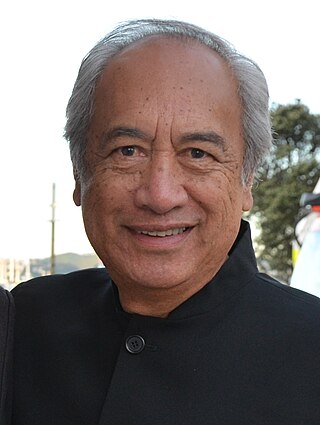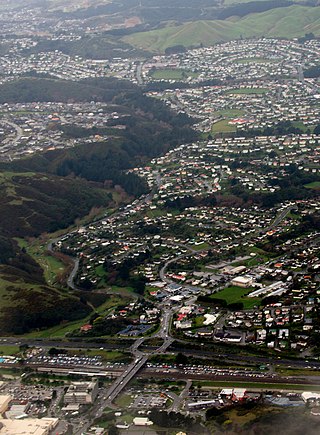
Witi Tame Ihimaera-Smiler is a New Zealand author. Raised in the small town of Waituhi, he decided to become a writer as a teenager after being convinced that Māori people were ignored or mischaracterised in literature. He was the first Māori writer to publish a collection of short stories, with Pounamu, Pounamu (1972), and the first to publish a novel, with Tangi (1973). After his early works he took a ten-year break from writing, during which he focused on editing an anthology of Māori writing in English.

Kura Te Waru Rewiri is a New Zealand artist, academic and educator. Art historian Deidre Brown described her as "one of Aotearoa, New Zealand's most celebrated Māori women artists."
Tungia Dorothea Gloria Baker was a New Zealand actor, weaver, and administrator. Her notable acting roles included Ngahuia in the 1980s television drama Open House and Hira in the 1993 film The Piano. Baker was influential in contemporary Māori theatre, Māori film making and Māori arts. She named the Taki Rua Theatre, and was a founding member of Māori artists' collectives Te Manu Aute and Haeata.

Te Whānau-ā-Apanui is a Māori iwi located in the eastern Bay of Plenty and East Coast regions of New Zealand's North Island. In 2006, the iwi registered 11,808 members, representing 13 hapū.
Apirana Taylor is a New Zealand poet, novelist, performer, story-teller, musician and painter.
Nancy Brunning was a New Zealand actress, director, and writer who won awards in film and television and made a major contribution to the growth of Māori in the arts. Brunning was of Māori descent from the tribes of Ngati Raukawa and Ngai Tuhoe. She won the best actress award at the New Zealand Film Awards for her lead role in the film What Becomes of the Broken Hearted? (1999), the sequel to cult classic Once Were Warriors. In 2000, she won the Best Actress in Drama award at the New Zealand Television Awards for her lead role in the television series Nga Tohu. She was the acting coach for the Oscar-nominated short film Two Cars, One Night directed by Taika Waititi. According to friend and frequent collaborator Temuera Morrison, she "paved the way" for Māori actors in New Zealand.

Briar Grace-Smith is a screenwriter, director, actor, and short story writer from New Zealand. She has worked as an actor and writer with the Maori theatre cooperative Te Ohu Whakaari and Maori theatre company He Ara Hou. Early plays Don't Call Me Bro and Flat Out Brown, were first performed at the Taki Rua Theatre in Wellington in 1996. Waitapu, a play written by Grace-Smith, was devised by He Ara Hou and performed by the group on the Native Earth Performing Arts tour in Canada in 1996.
Raymond Richard Waru is a New Zealand Māori radio and television director and producer.
Te Uruhina McGarvey-Tiakiwai was a New Zealand Māori leader. A kuia of Ngāi Tūhoe and Te Arawa, she was also of English and Scottish descent.
Katie Wolfe is New Zealand actor and film and stage director. She was in the New Zealand television series Marlin Bay in the 1990s, Shortland Street in the late 1990s and Mercy Peak for two years. Her screen directing work has won several awards including Redemption at the ImagineNative Film + Media Arts Festival and This Is Her at the Prague International Short Film Festival. Her current creative work is writing and directing a stage play called The Haka Party Incident, produced by the Auckland Theatre Company and programmed by festivals through New Zealand across 2020 - 2022.

Chelsea Jane Winstanley is a New Zealand film producer. She produces short films and documentaries which celebrate Indigenous peoples. She also produced the films What We Do in the Shadows and Jojo Rabbit.
Renae Maihi is a New Zealand film director and screenwriter. She is best known for her work on the films Waru and We Are Still Here, both of which premiered at the Toronto International Film Festival in 2017 and 2022 respectively.

Rānui is a suburb of West Auckland, New Zealand, which is under the local governance of Auckland Council. The area is densely populated but close to the western fringe of the Auckland urban area.
Reihana Parata is a New Zealand Māori tohunga raranga from the Ngāi Tahu iwi. For 11 years Parata was matron at the Te Waipounamu Māori Girls' College in Christchurch.

Rānui Ngārimu is a New Zealand Māori weaver and textile artist. She affiliates with Ngāi Tahu and Ngāti Mutungā iwi.

Dame Hinewehi Mohi is a New Zealand musician and producer, best known for her double-platinum album Oceania (1999) and its lead single "Kotahitanga (Union)", performing the New Zealand National Anthem in Māori during the 1999 Rugby World Cup, and as a producer for the 2019 Māori language compilation album Waiata / Anthems.

Rānui is a suburb of Porirua City approximately 21 kilometres (13 mi) north of Wellington in New Zealand. Rānui means midday in the Māori language.
Miriama McDowell is a New Zealand actor, director and playwright of Māori descent. She is a graduate of Toi Whakaari.
Tayi Tibble is a New Zealand poet. Her poetry reflects Māori culture and her own family history. Her first collection of poetry, Poūkahangatus (2018), received the Jessie Mackay Prize for Poetry at the 2019 Ockham New Zealand Book Awards, and was published in the United States and the United Kingdom in 2022. Her second collection, Rangikura, was published in 2021.
Amber Curreen is an actor and theatre producer based in Auckland, New Zealand. She played character Shannon Te Ngaru on Shortland Street. She is a producer with Auckland theatre companies Te Rēhia Theatre Company and Te Pou Theatre.









